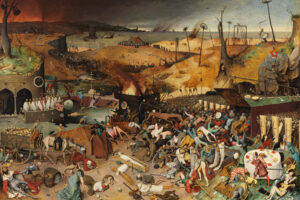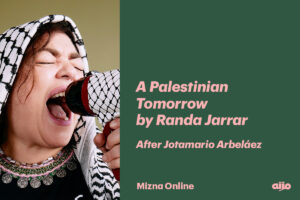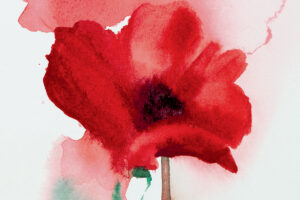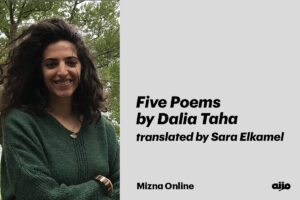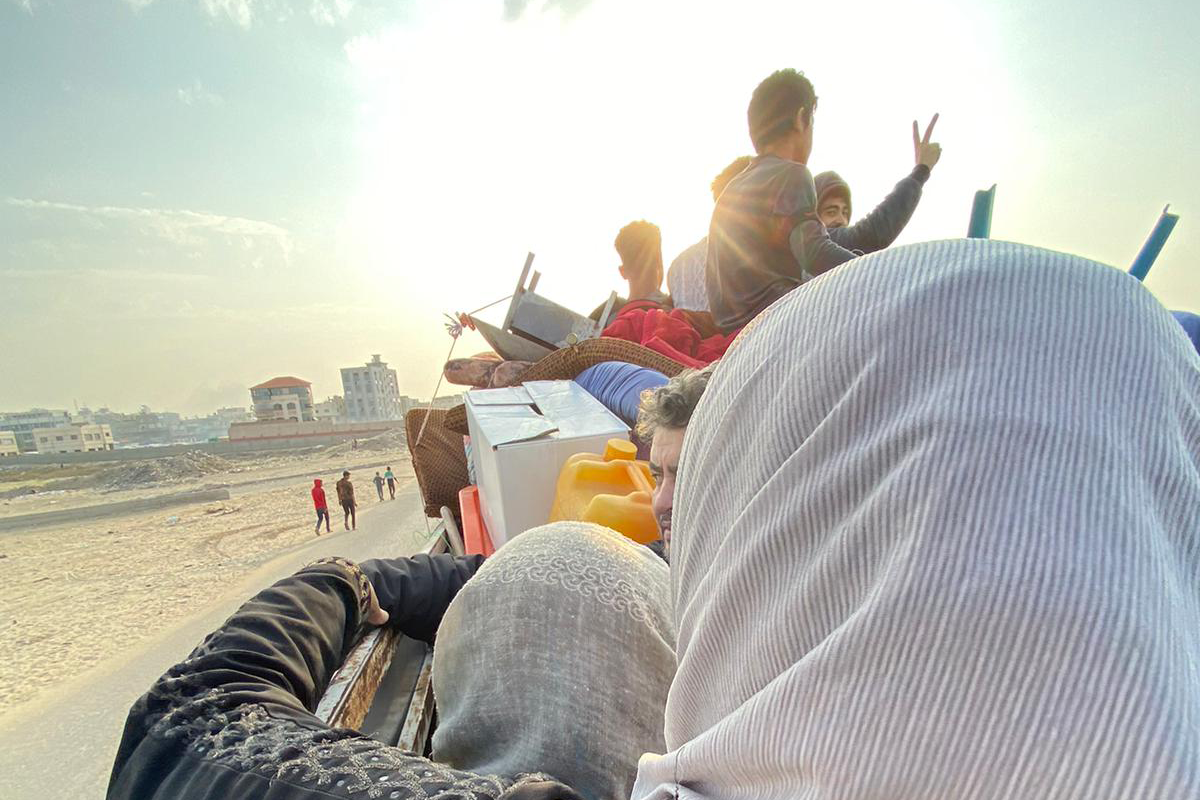
February 12, 2024
It was All Songs: A Letter from Gaza
trans. by Sarah Aziza
Today, we are honored to feature Sarah Aziza’s literary translation of a letter from her cousin, Nabil S., who is currently writing to her from Gaza. As I read over this exchange, I think of the ways love is baked into every aspect of the form: the love implicit to a letter exchange with a family member in the midst of catastrophe, the love implicit to this caring and generous translation. Nabil always wanted to be a writer, Sarah texted me in preparation for this piece, attempting to translate a moment of potential excitement from within a catastrophe that has murdered and more than triply displaced her family members abroad. Here I am reminded that the genocidal wounds we are witnessing from Gaza cannot be conceptualized by figures such as over 1% of civil society murdered, or over 360,000 residential buildings destroyed, according to Al Jazeera’s latest numbers. How can we even begin to conceptualize the psychological wounds for Gaza’s coming generations? What future do any of us have to look toward? And what better way to hold these hope/less tensions, these impossible acts of witness, than the time capsule of a letter? I am lucky enough to have had my own letter exchange with Sarah recently, and am grateful for her thoughts and contributions to our thinking on witness at this moment. I am grateful to her for bringing Nabil into these conversations via her translation, alongside photos he was able to take these past few months.
—George Abraham, Mizna executive editor
Regretfully, I had to leave all my books behind. I couldn’t bear to make the choice between my beloveds, so I left them all.
Give them back. Give us back our beds. Give us back our offices. And give us back our books.
—Nabil S. (trans. Sarah Aziza)
It was all songs
Our talking—it was all songs, a bit of poetry, letters made of kisses, the eagerness of a lover, and a torment of longing. The talk was hope and the talk was life. It was hours on the phone, and friends always nearby, and coffee—my darling, there was coffee! And when we drank, we sipped it—truly, we sipped. But if any coffee remains, it is by sheer coincidence. Even this precious, scarce coffee, this bon1 is overshadowed by another word—ton. A ton of explosives, a ton of lies about “aid,” and where is the watan, the homeland?
My dear life, I’m still searching, little by little, for shelter, or what they call a “tent.” And in the midst of searching for hope for this human soul, all forms of humanity are falling away from us. Yet humanity is within us. And inside us, there is a dignity we can choose—this is how we were raised. But everything has fallen. We have been forced out, and what they call “displacement” is another lie and another atrocity.

And all that we left behind—our homes, and the smell of our rooms, and the sounds of our walls, and the talk of our neighbors, and the birds of sunrise, and the rooster of dawn—this is not displacement, but the breaking up of hearts.
So let us rephrase our situation and look clear-eyed at ourselves to see this is not a dream or nightmare but reality, a ghastly and disgraced reality.
The memories brought up on your smartphone return you for a moment to your past life, to its atmosphere of ease and the embrace of friends. It is as if this forgotten life now presses itself upon us against our will—for these pictures are all that remain of our family and loved ones. Only photos, for us to weep and lament over, for we locked the doors tightly when we left our homes. We left with the keys in our hands.
Sixty years from now, will the media show us, still holding our keys? But we were lied to. They lied when they acted as if it would be an easy thing to leave, and we’d be along for the ride. But will the price of potatoes ever go back to one shekel? For years, we have dedicated ourselves to our work, toiling patiently, hoping that great love would deliver us and quench us with the sweetness of life.
Now, we hope tomorrow will bring us what we need—a safe apartment, a bed to hold us, if only for a little while. All we worked for has gone to dust, and all that remained of the “sweat of our brows” has been spent on bottles of water, some tomatoes, cheese, and canned goods. All this could have been gold2 in the hands of those we love, instead of being gone, never to return. A small difference in grammar can negate meaning entirely.

Before this, my father looked young despite his age. His hair was dusted with gray, but he shone. He was beautiful. Now, he is written all over with worry—three months of suffering have done to him more than all his years. What do you imagine he will do, if the gray hairs begin to show in us?
No one can hasten or delay their own death. But we hustle in the queues for the bathroom, for water, for the distribution of aid—we must hustle for the crumbs of life. I write, and my mind fills with good memories—how our lives used to begin at midnight. And now, our lives begin at the cusp of dawn and end at the last grave to the unknown martyr—why?
He is someone who was martyred, but among those who know him, he is the one who has gone and never returned. He is the one whom his son is waiting for, or one awaited by his father or sweetheart. But he has gone and has not returned. He is the one fate and the moon will weep for. His family will live boxed inside doubt, asking even the dust if it has seen him passing by. No, he is not unknown, he is the furthest thing from that. He is his family’s great calamity, he is the bitterness of loss, the hope of his father, and the companion of the Prophet.
I remember well, during the last truce, how I went back to my bedroom. It was still undisturbed. All the books I loved to read were still safe. My pictures, well, they had some dust on them, but they were still beautiful. Everything deserved an embrace—every thing. I tidied up my office, cleaned my bedroom, and slept in it the seven nights of the seven-day truce. It was like a remedy, bringing me back to life.
Regretfully, I had to leave all my books behind. I couldn’t bear to make the choice between my beloveds, so I left them all.
Give them back. Give us back our beds. Give us back our offices. And give us back our books.
Then someone asks me, What do you want?
I want an espresso.
He looks at me and asks, what?
Nothing. How much is the cheese today?
Nabil S. (translated by Sarah Aziza)
Nuseirat Refugee Camp & Khan Younis
January 4, 2023

الحديث كله اغنية وسطرين شعر وحروف من القُبل ولهفة محب وعذاب مشتاق
كان الحديث امل وكان الحديث حياة ، اتصال بالساعات واصحاب بالجوار
وقهوة يا عزيزي كان هناك قهوة ، كنا نحتسي القهوة كان فعلا اسمها احتساء ، ما تبقى من بن هو محض مصادفة عائمة لا تلامس الحقيقة من شيء ، هذا البن في شحه غلبته كلمة اخرى “طن” طن من المتفجرات وطن من اكذوبة المساعدات ، واين الوطن ؟
عزيزتي الحياة ، ما زلت اسعى شيئا فشيئا لمأوى او ما يسمى خيمة ومع كل بحث عن امن لهذه النفس البشرية تتساقط منا كل انواع الانسانية ، ان الانسانية في داخلنا طابع وكرامتنا في داخلنا اختيار ، لقد سقط كل شيء ،لقد هُجرنا قصرا وما يسمى بالنزوح فهو اكذوبة اخرى او فظاعة اخرى ، ما تُرك من بيوتنا ورائحة غرفنا وصوت حوائطنا وحديث جيراننا وعصافير الشروق وديك الفجر ليس نزوح بل تقطيع للقلوب ، اذن فلنعيد صياغة واقعنا ولنبدو محقين اتجاه انفسنا ان هذا ليس حلم او كابوس انه واقع وهو فعلا واقع ودنيء، ان اختلاف الذكريات التي تنشئها هذه الجوالات الذكية يعيد لك للحظة حياتك السابقة جوها العفوي واحضان الرفاق وكأننا نسيناها وكأن تطبعنا رغما عنا ، ان ما تبقى منا ايها الاهل ايها الاحبة بعض صور نبكي ونتباكى عليها ، لقد اقفلنا الابواب جيدا عند خروجنا اخذنا المفاتيح ، لا اعلم ان كانت القنوات ستنقل بعد ستون عاما اخرى تمسكنا بالمفاتيح ، لقد كُذب علينا بأنها ستهون وستمضي بنا الركوب ، ولكن من يعيد سعر البطاطا الى شيكل ؟
لقد تفانينا بعملنا ولقد افنينا اعوامنا نعمل ونكد ونلعق الصبر مرارا املين بحب كبير يأخذنا من تحت الذراع ويسقينا حلاوة الحياة ، نأمل بغد وفير وشقة مؤمنة وسرير يحملنا ولو لقليل ، ان ما جنيناه ذهب تحت التراب وما تبقى من “عرق جبينا” ذهب على زجاجات الماء وبعض البندورة والجبنة والمعلبات ، وكان من الممكن ان يكون كل ذلك دهبا في ايدي من نحب وليس ذهب ولم يعد، اختلاف نقطة تلغي المعنى ، لقد كان ابي يبدو يافعا رغم كبر عمره ، كان يبدو عليه الشيب قليلا ولكنه كان براقا جميلا ، ان ابي الان رأيته للحظة كهلا يكسوه الهم ما لم تفعله به السنين كلها فعلته به ثلاث شهور من المعاناة، ماذا تراه يفعل ان كان الشيب بدا بالظهور فينا ، لا احد يستبق موته او يأخره ولكن علينا ان نستبق طابور الحمام وطابور الماء وتسليم المساعدات ، علينا ان نستبق بعض من فتات الحياة ، اني اكتب وامري كله مملوء بالذكريات الطيبة ، لقد كانت تبدأ حياتنا في منتصف الليل واصبح تبدأ حياتنا عند حدود الفجر وتنتهي عند آخر مقام لشهيد مجهول الهوية ؟
هو شخص استشهد ، ولكنه بين عوام اهله شخص ذهب ولم يعد ، شخص انتظره ابنه او والده او حبيبته ولكنه لم يعد شخص سيبكي عليه القدر ويبكي عليه القمر ، وسيعيش اهله مستطيل من الشك وسيسألون التراب ان مر بها ، انه ليس مجهول الهوية انه ابعد من ذلك بكثير انه مصيبة الاهل ومرارة الفقد وامل والدة ورفيق الرسول
اذكر جيدا في فترة الهدنة الاخيرة عدت لغرفتي ، وكانت ما تزال بخير ، كتبي التي احب بقيت جيدة بعض صوري عليها الغبار ولكنها صوري انها جميلة ، كان كل شيء يستحق العناق كل شيء ، رتبت مكتبي ونظفت غرفتي ونمت بها سبع ليالٍ بسبع ايام هدنة ،،لقد كان الامر اشبه بترياق للحياة ، لقد اضطررت اسفا ان اترك جميع كتبي ، لم ارغب ان اقع باختيار قاسي بين الكتب احبتي فتركتها جميعها ،اعيدوا لنا اسرتنا ومكاتبنا وكتبنا
ثم يسأل احدهم ماذا تريد
-اريد الاسبريسو
نظر الي وقال ماذا ؟
-لا شيء “بكم الجبنة اليوم”
- 1. The original Arabic term for coffee used in this line is البن, transliterated as “bon.” ↩︎
- 2. Another play on words, as the word “gold” and “gone” in Arabic are homonyms, and “hands” and “return” are off-rhymes. ↩︎

Nabil S. was born and raised in Gaza, and is a trained pharmacist. His family was forcibly displaced from their home in Nuseirat in December, 2023. On January 6, he shared: “I was always busy in the pharmacy, and now they have made me unemployed and my job will be to show the barbarity of this occupier and the beauty of our people despite the suffering.” He is the second of eight siblings.

Sarah Aziza is a Palestinian American writer who splits her time between New York City and the Middle East. Her essays, journalism, poetry, and creative nonfiction have appeared in the New Yorker, the Baffler, Harper’s Magazine, the New York Times, Lux Magazine, the Intercept, NPR, and the Nation, among others. She is the recipient of numerous grants from the Pulitzer Center on Crisis Reporting, a 2022 resident at Tin House Books and a 2023 Margins Fellow at the Asian American Writers’ Workshop. Her forthcoming book is a hybrid work of memoir, lyricism, and oral history exploring the intertwined legacies of diaspora, colonialism, and the American dream.

Toward a Free Palestine: Resources to Learn About and Act for Palestine
We are proud to present this text as part of a list of resources to take action for and learn about Palestine, as well as works by Palestinian artists, writers, activists, and cultural workers.





